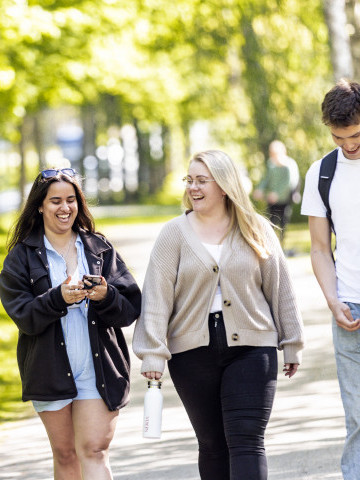
Bachelor and Master Degree Programmes
Business
- Master of Business Administration, MBA, Digital Business and Management, full or part time, Vaasa
- Master of Business Administration, MBA, Sustainable Business Design, full or part time, Turku
Bioeconomy
- Bachelor of Natural Resources, Sustainable Coastal Management *, daytime studies, Raasepori
- Master of Natural Resources, Natural Resources Management, Online studies, part time
Technology and Seafaring
- Bachelor of Maritime Management, Maritime Management, Captain, daytime studies, Turku
- Bachelor of Maritime Management, Maritime Management, Captain, blended studies, Turku
- Bachelor of Engineering, Maritime Technology, daytime studies, Turku
- Bachelor of Engineering, Maritime Technology, blended studies, Turku
- Bachelor of Engineering, Information Technology *, daytime studies, Vaasa
- Master of Engineering, Intelligent Systems, part time studies, Vaasa
- Master of Engineering, Autonomous Maritime Operations, part time studies, Turku
- Master of Engineering, Industrial Management and Engineering, part time studies, Vaasa
- Master of Engineering/Master of Maritime Management, Maritime Management, part time studies, Turku
- Master of Engineering, Structural Engineering, part time studies, Raasepori
Health and Welfare
- Bachelor of Health Care, Nursing, daytime studies, Vaasa
- Master of Health Care/Master of Social Services, Health Care and Social Services, Online studies
- Bachelor of Beauty and Cosmetics, Beauty Care, Vaasa
- Bachelor of Health Care, Biomedical Laboratory Science, Vaasa
Arts and Humanities
-
Bachelor of Culture and Arts, Fine Arts *, Pietarsaari
- Master of Culture and Arts, Entrepreneurship In the Arts, Creative Music Production, Pietarsaari
* - Eligibility criteria: 120 ECTS of previous university level studies.
Do you want to study in Swedish?
Take a look at our Swedish range of courses by clicking here.
Active Student Life at Novia UAS
Novium is the Student Union for all students at Novia UAS. Novium trains Tutors and takes care of student advocacy at both national and local levels. Novium appoints student representatives for internal and external cooperation bodies, as well as guarding student rights and working towards fair treatment.
Student Associations at Novia UAS
Student associations are located on each campus and their task is to arrange activities and help create a pleasant study experience and overall atmosphere for their students. Many of the associations have their own, expedient spaces and organise activities, such as sitsfest (sitzer in Swedish; sitsit in Finnish), excursions, and exercise events. You can find a list of the different Student Associations on the Novium Student Union website.